This is the transcript for my podcast. If you would rather take in a nap while listening to this story, then you can click here to play it in the browser. To subscribe on iTunes, click here. Have feedback? Corrections? Suggestions for future shows? Let me know on twitter.
Blood of the Dragon
This week on the Myths and Legends podcast, we’ll see Sigurd finally fight the dragon, and then the young man, who’s lived his life in honor and peace, will take a hard left and, you guessed it, spark a cycle of revenge that will leave most dead. It seems like I’ve said that phrase for every episode in this series. You’ll also see that, should you find an evil magical ring that promises doom and destruction to whomever owns it, you should definitely use it to propose marriage to a stranger mere days after meeting her. In the creature of the week you’ll see that if you’re missing a sandal, it’s likely come to life, and it is only a matter of time before it’s running around your house, singing annoying songs.
This is the Myths and Legends podcast, episode 3D: Blood of the Dragon
Previously
This is a podcast where I tell the original tales behind legendary stories. Some are popular stories you know, but the original is very different. Some are more obscure stories that you really should hear.
Before I start, I want to thank Bananaphant for a great review. It’s awesome of you, and I appreciate it. Sorry if I said your name wrong.
Today I'm continuing the Saga of the Volsungs, the story of an ill-fated legendary Norse family. If this is your first time hearing the show, it's not the best place to jump in. The story starts on episode 3A.
Previously on the podcast, King Sigmund died in battle, and Gram, the magical sword from Odin, was shattered. His wife found safe passage to Denmark, and his son was raised by the kings there, in exile, while the man who killed his father ruled his kingdom. The son's name is Sigurd, and he was educated by Regin, the smith, who told him the story of his brother, the dragon Fafnir. The dragon sits on a hoard of gold, the most important object being Andivarinaut, a ring that all seem drawn to, yet one that brings death to its owners. Regin tempts Sigurd with glory should he slay the beast. Sigurd assents, on the condition that Regin re-forge Gram. He does, but Sigurd decides that his father must be avenged before holding up his side of the agreement to defeat Fafnir.
Vengeance
Sigurd asks for a meeting with an assembly of the kings, and they are all surprised to see one they thought to be a mere boy standing before them with the confidence of a man. It's as if the mysterious sword that hung at his hip brought out the Volsung confidence.
He tells the kings that he appreciates their hospitality, kindness, and support, and he wishes to raise an army of their men. Like his father said to his great rival, King Siggeir, before setting him ablaze,he wished Lyngvi and his brother to know that not all Volsungs are dead.
The determination and ferocity in his words rung through the halls. The kings got the feeling that if they did not give him the troops, nothing could stop the ma n from leaving by himself, venturing to his homeland, and cutting through the enemy armies until he found his true adversary. He was an unstoppable force, and they wanted to get behind him.
They gave him as large an army as they could. A couple months later, he stood on the bow in the largest of the dragon ships and smelled the salt in the sea air. He was going home.
Odin shows up again and hitches a ride in another confusing interlude of no real consequence, but then disappears.
Word traveled to the Volsung kingdom that Sigmund's son was on his way at the head of a large host, but it was too late. Sigurd's vikings jumped off the ships and cut down or set fire to anything or anyone who was in their way.
The people cursed Lyngvi and his brothers for their lack of foresight, and they felt the anxiety at this old enemy resurfacing, but it was too late. They knew they were overmatched, but that same pride that kept their other northman adversary, Sigmund, from running from a fight, kept them there too, and they stayed.
They fielded an approximately equal army, and though the day started out well, it quickly turned. Sigurd rode at the front, his sword, Gram, flashing in the sunlight. At first he rode with his men, then in front of them, then he broke clear away and dove into the enemy like, slicing through his enemies’ shields and mail like they were nothing, and diving deeper into the army.
His men followed, and desperation crept into Lyngvi’s army with each strike of Sigurd’s sword.
Lyngvi, to his credit, didn’t flee. Even after his army was routed. After his cities’ gates had been opened to enemy armies. After and he could see Sigurd charging at him with his magical sword, he stayed and fought. And died. Sigurd sat atop Grani, his horse, panting, savoring the victory his father couldn’t achieve. He had taken back his homeland.
Dragon Hunting
He stayed there for a time, purging the land of the sons of Hunding (Lyngvi’s father) and their rule, but there was something that remained to be done. He was a man of his word, and he needed to pay for the sword with which he had won back his birthright. He needed to kill the dragon Fafnir.
He left a steward in his place, and returned to Denmark to adulation. He went to meet with Regin. Regin, though he was now addressing a king, retained the tone of a tutor instructing a young man, telling him that now he will do what he promised. Sigurd replied that it had not been far from his thoughts the whole time. They prepared, and that day the left to go riding out to Gnitahearth.
Out riding on the moors, they came to a cliff overlooking a lake, and they went up it until they were looking off of it. It was about thirty fathoms, or 180 feet, high. Regin causually mentions that Fafnir lays down on this cliff to drink the water....the water that's 180 feet below them. Oh, and those holes on either side of the path coming up, those holes that they could sit it? Those are Fafnir's footprints. Oh, and that path – did you notice how it actually sits a few feet down into ground? That's because it's not a path – it's the indentation from Fafnir dragging his body up each time.
Sigurd's jaw drops. He says, and I kid you not, that Regin told him this was just a garden snake...this thing is a little bigger than a garden snake by, I don't know, a factor of 10,000?
Regin says, wait, I was speaking figuratively...I was saying your forefathers would see him as a garden sn...wow, did you really think I wanted you to kill a garden snake? It doesn't matter, he says. Sigurd vowed to kill this thing, so here they were.
As an aside, I'm choosing to believe Sigurd was just being coy with Regin, reminding of him downplaying Fafnir when they first spoke about him in light of the very obvious evidence of his power right in front of them. It's either that or Sigurd is impossibly stupid.
Regin knows his brother, and has watched him make this trip up to get water dozens of times. Fafnir is predictable, and will be there in a matter of hours. They don't have a lot of time to enact their plan.
Their plan, as Regin has come up with it, is to dig a hole on the path Fafnir usually takes, and then when he makes his way over the hole, to stab upwards with the magical blade. It's not the most heroic way of killing a dragon, but it's safer than taking on something that is potentially eighteen stories tall head on.
As Sigurd will be doing the stabbing, he agrees with the plan, and they dig together. They are just about done when Regin starts to get antsy. Fafnir will be here soon, and the last time Regin spoke with him, Fafnir murdered their father. He thought he could feel tremors in the ground of Fafnir's approach. He remembered something about the blood. The blood...but he could feel it now. Fafnir was coming.
What about the blood? What should I know about the blood, asked Sigurd, but Regin was preoccupied. He said if Sigurd was just going to be scared about everything, then he couldn't advise the man. He then, no joke, runs off in terror.
Sigurd can feel it now, too. He is about to jump in the hole, when a familiar bearded stranger taps him on the shoulder.
Sigurd says, “hey Odin,” to which the old man replies, “Odin? Who said anything about Odin. I'm just an old man wandering the wilderness dispensing valuable advice at the exact moment it is needed most. I'm definitely not Odin. I heard that guy is awesome, though. Totally cool and good-looking and the best at sports.”
“Ok, Odin,” Sigurd says, “what's your advice at this pivotal moment?”
“Oh, yeah,” the old man says, “well...I'm not saying I'm Odin, but if I was, I would advise you to dig multiple runoffs for the blood. Don't want to get that in your hole.”
“Ok,” Sigurd says, “wait, why don't I…” he began to ask, but the old man, who was definitely not Odin, disappeared in the same way Odin does literally every time he helps or hurts this particular family.
Sigurd sighes, and quickly digs some runoffs for the dragon's blood. He can see it far off on the moors now. The creature is long, like a snake with legs, but huge. Even though he is still at least a mile out, Sigurd can see Fafnir clearly. He jumps in the hole, hoping Fafnir didn't see him, too.
Dragon Slayer
He waits, and the ground begins to tremble with each step. Dirt shakes down from the wall, and about about ten minutes, he can hear the dragon breathing. It was said that Fafnir had poison breath, and the reputation of said breath is what kept people from approaching and trying their hand and taking his treasure. He breathed it all over the path ahead of him, though Sigurd wasn't scared.
Why he wasn't scared I have no idea. I guess he was in a hole and not technically in the direct path of the breath, but still, I would worry that it would be denser than air and settle in the hole, but I digress.
Fafnir passes over, scraping the top of the hole and blotting out all light, raining dirt down on Sigurd. Sigurd grits his teeth, and doesn't hesitate for a second. He drives the magical sword, Gram, up into Fafnir. The sword goes in up to the hilt, and Sigurd keeps pushing, blood raining down around him, up to his chest.
Fafnir feels this horrible wound, and does what any other living thing would try to do in this situation – run. Get back from the pain and assess the situation. Unfortunately, he drags himself on the ground, and so as he tries to get away, he pulls the sword, still up to the hilt, along the entire length of his body, turning what might have been a minor wound into a mortal one. He drags himself off to the side of the road, and looks at the damage.
He is there when he sees Sigurd's head pop out of the hole and look around. Did he do it? Is Fafnir dead?
No, he wasn't, but he was amused. He labored through his breathing to chuckle. Sigurd stood poised to attack, but saw how wounded the creature was. He relaxed, apparently forgetting about the poison breath. He climbed out of the hole.
The dragon asked who the man was – who his family was, and why he was so stupid as to bear weapons against him. Sigurd replies that he has no family. He is called the “noble beast”and he travels alone. There was a thought in the middle ages that you wouldn't want a dying man (or in this case, dragon) to know your real name, because he could curse it as he died. Fafnir says, no, really, what's your name? And Sigurd relents, saying he is Sigurd, son of Sigmund.
Fafnir demands to know who put him up to this. It's here I should add that Fafnir mentions that he keeps the land afraid of him through his “helm of terror.” This has only been mentioned in the text after Sigurd defeated Lyngvi, and I've kept it out for simplicity's sake. It's unclear whether this helm is an actual helmet, or something else. It's back in Fafnir's lair, and we'll see it in a moment. For the sake of this story, let's just say it's a magical piece of armor.
Anyway, Sigurd says that he chose to do this – few are brave in old age who were cowardly in their youth. Fafnir tells him that he may think he's won, but the gold back in his lair will be Sigurd's death. Sigurd kind of awesomely replies that all men die, and all men want to be rich, so he will take the gold in order to be rich until his death. I guess he has forgotten about his inheritance back with the kings.
He and Fafnir then begin talking about seemingly random tidbits from Norse mythology, culminating in Fafnir somehow realizing it was Regin that had maneuvered all this. He says he is gladdened that the gold will also lead Regin to cause Sigurd's death, and then curse Regin. He muses about how powerful he was, wearing his helm of terror with his poison breath, slipping further and further from life. He then gains a moment of lucidity, and warns Sigurd to leave now. Ride far, far away from here. When someone receives a mortal wound, they avenge themselves.
It seems like he's threatening violence here, but I take the threat of vengeance to mean that the curse of the gold will destroy Sigurd. Remember, he still has his poison breath, so Sigurd is trapped either way. It could be if Sigurd chooses to leave, Fafnir could poison him. Sigurd says that he will ride to Fafnir's den and take every last thing he can find. Fafnir sits back, repeating that the gold will bring his death. Sigurd says he would leave right now if it meant living forever, but repeats that every man must die, and so he will be wealthy until that day comes for him. That day, he continues, is here for you, Fafnir. Sigurd remarks as he walks away that he will leave the dragon here, in his death throes, until Hel, the ruler of the underworld, comes to claim him.
Bird is the Word
Sigurd traces the trail back a ways, and sees Regin approach. Regin sees that Sigurd is covered in blood, alive, and not sprinting away, so he rightly assumes Fafnir is dead. He smiles and hails Sigurd, pretending as if he hadn't called him a coward and ran off. They go together back to the dragon, who's now dead. When they get close, Regin looks down at the ground, and the dirt in the path soaks up a few tears that fell. He says, “you slew my brother, but I can hardly be considered blameless in the deed.”
They argue about whether or not it was Regin's craftsmanship in the sword that killed Fafnir or absolutely everything else that Sigurd did, with the clear winner to anyone who gives it less than half a thought being Sigurd, because really. Regin sits down, visibly shaken, and mutters again about his hand in killing his brother.
There is something that needs to be done, though, and Regin makes a strange request. Before they go and check out the hoard, they need to do something. Regin asks Sigurd if he will cut out Fafnir's heart, roast it, and Regin will eat it. I, personally, don't get the reasoning behind this at all, but Sigurd agrees to the request, and Regin takes a walk, but not before scooping up some of Fafnir’s blood and drinking it…because even though he’s shaken up about his brother’s death, he’s not so shaken up to not drink his blood and keep from eating his heart.
Sigurd goes about the grim business of cutting out the heart, building a fire, and roasting it on a spit. Time passes, and Regin still isn’t back yet. The heart is bubbling and sputtering juices, and Sigurd thinks it might be done, so he gets a bit of the juice on his finger, to try it. As soon as the juice touches his tongue, the countryside erupts into chattering.
Previously, it had only been a mostly quiet moor in the middle of the afternoon, but now it sounded to Sigurd like he was in the most busy district of the market. Voices, all around, from every direction. And they were all talking about him. He ran and ducked behind a bush..
Minutes passed, and he was able to connect these voices to sources. Birds. What were once pleasant notes were now words, and they streamed incessantly from the bushes, trees, and sky.
“He should eat the heart himself,” Sigurd heard, then “Regin is playing false with him and means to betray him,” in another snippet of a conversation. He heard “strike off his head,” and, “take the gold for himself,” and, “all to himself.”
He was able to zero in on a conversation between a few in a bush nearby:
“He would be wise to do as they say,” the first bird said, “and then ride to Hindfell, where Brynhild is sleeping. There he would learn much wisdom.”
“Yes,” said a second, “I agree. If he lets Regin live after killing his brother and expecting no retribution, he is not as wise as I would have thought. Especially since Regin means to betray him.”
“You are right,” said the third bird, “it would be a sound plan if he killed Regin and had the treasure all to himself.”
It was then that he saw the old smith, Regin, walking up the road. Sigurd rested his hand on his sword, and said that it was not his destiny to be killed by some old man in the wilderness. Better that both brothers go in the same way.
Regin walked up and greeted Sigurd, saying the heart was ready. Regin sat, and Sigurd brought him the heart, cooked and skewered on a spit. Regin eyed it, and opened his mouth.
Behind him, thoughts raced through Sigurd. Now was the time – who knew what power Regin would get after he consumed the heart? And if the man was plotting to betray him, as the birds said, then what choice did Sigurd have? Besides…all the gold. Regin was a greedy man…Sigurd knew this. Since boyhood the old smith had been talking about Sigurd’s wealth. Now he was probably going to become like his brother, killing for Andvari’s gold. No, Sigurd didn’t just slay a dragon to die at the hands of some sad little man.
He popped Gram out of its scabbard and in one motion drew it and lopped off Regin’s head before the man could take one bite. His foster father – his tutor since childhood – was dead by his hand.
He snatched the heart and ate part of it…nothing…no wonderous powers, and the birds were still chattering on. He stored the rest of it in his pack, jumped on Grani, and rode off in the direction of Fafnir’s lair, leaving both brothers lying dead beside the path.
As an aside, it’s worth noting that we never see Regin’s motivations, and it’s unclear that he really intended to do Sigurd harm. It seems likely, given his preoccupation with Sigurd’s wealth throughout the boy’s childhood, his manipulation into getting Sigurd to kill Fafnir, and his increasing harshness in his dealings with the man. That being said, Sigurd struck first, and whatever validity was in the birds’ words will always remain a mystery. Sigurd, in his fear, was first to be corrupted by the ring, and first to act on his desire to be its sole owner.
I won’t speculate on his emotional state, but this is the first time he had not only killed someone, but done anything wrong. He’s committed murder, and that murder was of his friend and foster father. It seems like there are no heroes in these sagas, only survivors. The crimes of his ancestors are not far under the surface for Sigurd, and he’ll spend the rest of his life paying for this theft.
Also, if you’re wondering how the birds not only knew Sigurd and Regin’s names, but the exact details of their situations as well as their motivations and thoughts, well, those are really good questions.
Moving on. Grani sprints a ways, and they arrive at Fafnir’s lair. It has massive, impenetrable iron doors. They have only one design flaw, as it turns out. The doors must be closed. They aren’t, and Sigurd walks right in.
Sigurd spends as little time in the dank, smelly hovel as he can, and scoops every last coin up into two chests, which he hoists up and ties on Grani, who doesn’t appear overladen at all. He also takes the poorly-defined Helm of Terror. He finally finds the ring, Andvarinaut, and slips it into his pocket. He walks Grani out and decides what to do next.
Flight to the Valkyrie
He’s not sure if he can return to Alf’s kingdom, since he did, you know, just murder the king’s smith. What if he didn’t turn himself in, but also didn’t seek to hide the body? What if he just left?
He did remember the birds saying something about a keep nearby, one called Hindfell. There was supposedly one called Brynhild there, and they said he would gain wisdom. Maybe then he would know what to do? He spurred Grani, and they left the path and went off into the moors.
He rode south for days until he saw a keep, glowing in the night. Around it burned an unquenchable fire, but as he rode up to it, Grani sped up and, even laden with gold, jumped over the fire and brought Sigurd to the keep. He dismounted and entered.
Inside, he climbed to the top and found someone, apparently sleeping, in a suit of armor. He tried to rouse the person, but they wouldn’t move. He couldn’t move the faceplate, either, but noticed the armor was warm. He pulled out Gram and tried to cut the person out of it.
Gram made short work of the steel, and Sigurd was surprised to see that it was a woman. She gasped to consciousness.
This is Brynhild. When she regains her composure, she tells Sigurd a fantastic story.
She is one of Odin’s shieldmaidens, and different texts actually have her being a Valkyrie, though it’s left ambiguous in the primary one I’m using. Two kings were, surprise, fighting, and Odin had promised the victory to one. He sent Brynhild to see that it was completed, but she chose to give victory to the other king, and Odin was so angry that he made her sleep here, surrounded by fire. She would never again win a victory in battle, and she would be forced to marry a man who could brave the flames. She made a vow to herself to only marry a man who knew no fear.
She seems to know Sigurd, of the killing of Fafnir, and that he has come to her seeking wisdom. They eat together, and she teaches him many things.
There is a long bit where she teaches him about different runes, and then she launches into a long monologue detailing the strict code of honor that Sigurd should abide by, mainly telling when it is, and isn’t, prudent to kill. Don’t kill: for small offences that can be overlooked. Do kill: for large offences. Don’t kill: drunk people when they say something insulting to you. Do kill: drunk people they next day, when they’ve sobered up a bit.
Remember what I said in the second episode? About the world being a different place in the middle ages? Yeah.
She also says Sigurd shouldn’t trust good-looking women, which sounds a little self-serving, as we’ll see, that he should do right by dead people and honor their wishes, and that he, surprise surprise, shouldn’t trust someone if he’s killed their father, brother, or any other near relative.
She also prophesies his marriage to another woman, and his death.
He says, wow, I love you. I think we’re really suited for each other. Let’s get married.
She says, hey, you must not of heard anything I said. But ok, you’re brave, and I like you. Let’s hope I’m wrong about the marrying another person and dying thing.
Things are looking up for Sigurd, and so he says, wait, I have just the thing to cement our engagement, and runs downstairs. He returns with a ring. Yes, that ring.
If there was any worse portent for a relationship than proposing with a legendary cursed ring, I don’t know what it is. He gives it to her, though.
There are versions that include them spending some...closer…time together and her subsequently giving birth to his daughter, Aslaug, while he’s away. She will eventually grow up and marry the legendary king Ragnar Lothbrok, in a slightly more historically grounded legend we will tackle at a later date. And yes, if you’ve seen the History Channel series Vikings, that’s the main character. I’ve only seen the first season, and it’s fairly decent. For the purpose of this story and tying it to Ragnar’s tale, I’ll include it, but just know that it’s not really in many versions.
The next morning he leaves her, surrounded by fire and alone in a keep. I haven’t the slightest idea why he does it, and it’s not just a “hey, I’ll go find someone so we can get married and you can leave,” or “I just need to drop my gold off and come back with another horse for you.” No, he leaves for an unreasonably long time, venturing to another kingdom entirely…
Next Week
That’s it for this week. Next time, I’ll finish the Saga of the Volsungs, and we’ll see if Sigurd will be the first in his family to not die a violent death…even though he’s on the run for murder…and just got a cursed ring that brings death to its owners… and swore an oath to a possible Valkyrie and abandoned her…
I say next time, because I’m going to be out next week. It’s the fourth of July here in the states, and I will have family in town for the long weekend. I’ll be back the week after, though, and we’ll finish this thing up.
As a consolation, the story of Sigurd and Fafnir is pretty well-known, so there are a great deal of artistic renderings of it. I, personally, am a fan of Arthur Rackham’s art, so I’ve included a lot of that on the website. There’s a link in the show notes, but if you can’t get to that for whatever reason, you can just go to www.mythpodcast.com.
And before the creature of the week, I just want to say the obligatory, if you’ve enjoyed the show, please please please leave a review on iTunes. It’s a huge help for other people to find it, and, honestly, an encouragement for me. It’s free and easy, and I really appreciate it. You can find it on itunes at Itunes.mythpodcast.com
Creature of the Week
The creature this week is…just great. It’s from Japanese mythology, and it’s called the Bakezōri, literally meaning “ghost sandal” and, yes, it’s a sandal that comes to life.
I actually just learned this this week, but there’s a belief in Japanese folklore that once items reach the age of 100 years, they can come to life. In general, they just play pranks on people, but if you mistreat items or throw them away needlessly, a lot of them can band together to take revenge, whatever that might look like. I don’t think the sandal needs to be 100 years old to come to life, though, and can gain sentience if they are mistreated or forgotten…or just out of boredom and frustration.
The ghost sandal is really just one of those pranksters, though. If you mistreat it, it will run around your house at night yelling, “Three eyes and two teeth!” and there’s some debate what this is in reference to, but it seems like it is a certain type of Japanese sandal, called the geta, with three holes in it for the straps (the two eyes) and two pieces of wood on the bottom, or the teeth.
It can band together and hang out with other items that come to life, or it will just leave your home and run away. If you are looking for sandals you haven’t worn in a while and can only find one, you might as well give it up. It’s probably long gone, having hit the road for whatever sort of life a living sandal can have.
That’s it for the show this week. The theme music is by the band Broke for Free, and the Creature of the Week music is by the contemplative Steve Combs. Thanks so much for listening, and I’ll see you next time.

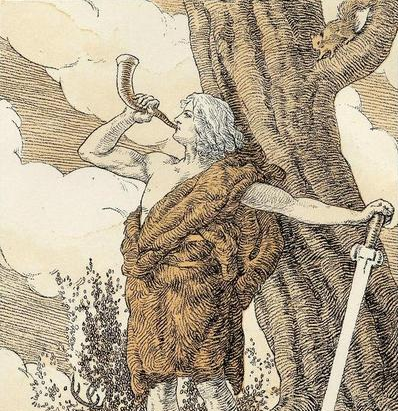
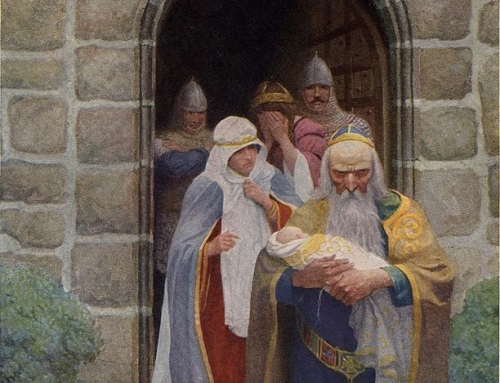
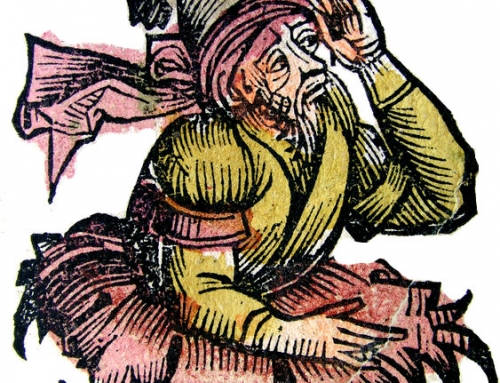

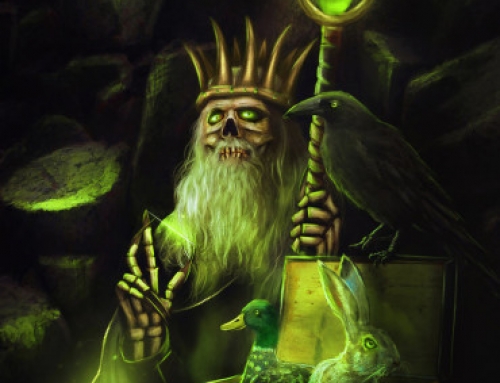
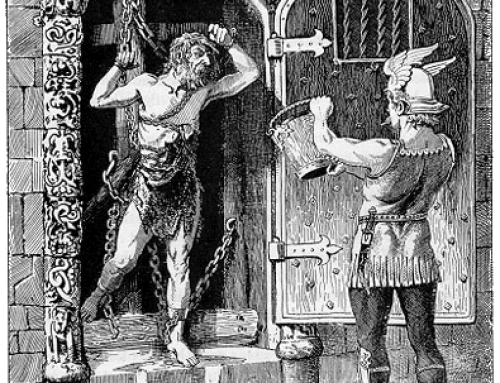
Leave A Comment